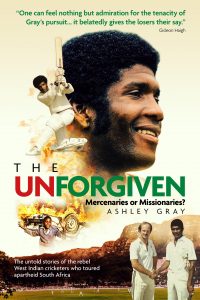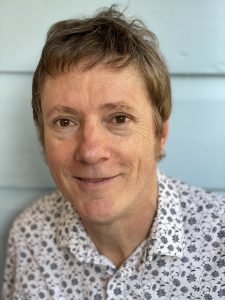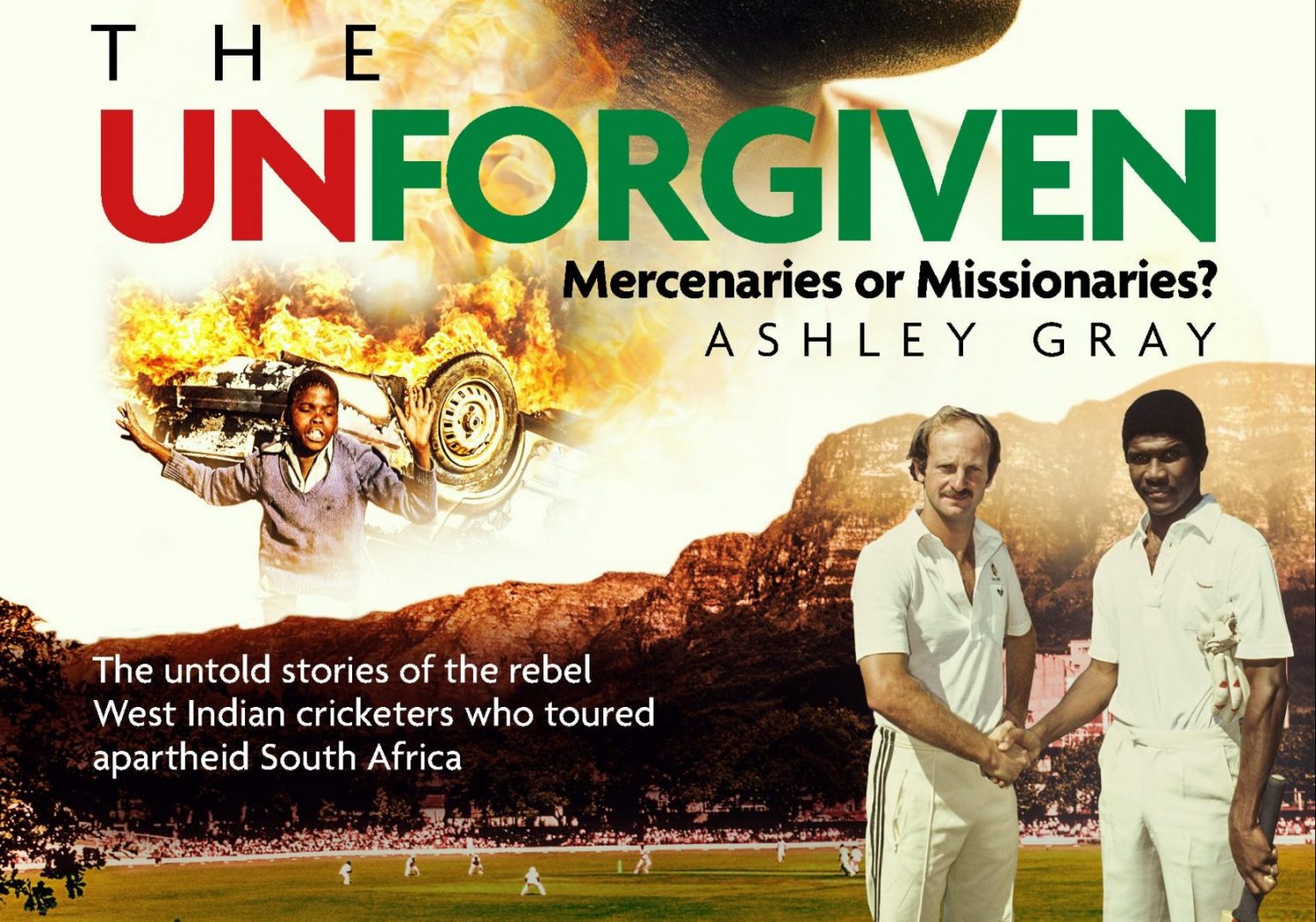Ashley Gray (Fr 1985) is a freelance sports writer and subeditor. His stories have appeared in Wisden Quarterly, Fox Sports, The Sydney Morning Herald, Daily Telegraph, The Guardian and All Out Cricket. He has recently published a book, The Unforgiven, which follows the untold stories of the West Indian cricketers who were shunned by their country for their involvement in the rebel tours of apartheid South Africa. We caught up with Ashley to discuss the release of his book and reflect upon his time at College.
Please tell us a bit more about yourself – where are you originally from and where did you grow up?
I grew up fending off bouncers and sledges in Newcastle. In the 1970s and 1980s it could be quite a hard-core place, but it’s a city with great character and lots of nooks and crannies to lose yourself in.
How did you come to be a resident at St Andrew’s College?
Sydney always beckoned. Newcastle is defined by its close proximity to the “big smoke”, Sydney. When you’re a Novocastrian, you’re either moving there, returning or contemplating one or the other. I was vague about what I wanted to do but there were limitations as to what you could achieve in Newcastle. My Mum wanted me to be a diplomat, and I wanted to be a rock star. Journalism seemed like a happy compromise. There were five of us who came from Merewether High School to Andrew’s in 1985. But there was no pact; I’d actually interviewed at Paul’s first but the Bursar at Drew’s was much friendlier. Then one of my best friends from school, Graham Callaghan, signed on. It was nice to have a base of schoolmates there. I don’t think any of us could have flatted. We were just boys.
Can you tell us one of your favourite memories of College?
I loved the high-intensity, philosophical arguments/debates you could have in the Dining Hall with just about anyone over lunch. There was a sense in which you were pushing intellectual boundaries and engaging with the great minds of your generation. I also loved the celebratory nights – usually after a sporting victory, or some obscure Scottish rite – in the Dining Hall. The crazy songs, the roistering, the camaraderie. It was a special time, never to be repeated.
You’ve recently written a book, The Unforgiven, and it’s been shortlisted for the William Hill Sports Book of the Year and The Guardian named it one of its five sports books of the year. Congratulations on these achievements! Can you tell us a bit more about the book and how it feels to have it be so well received?
The Unforgiven is the tragic story of the rebel West Indian cricketers who toured apartheid South Africa in the 1980s. In some ways it’s a classic money versus morality tale. Some of the biggest names in Caribbean cricket, such as Lawrence Rowe, Colin Croft and Alvin Kallicharran, were lured to the pariah republic with promises of unimaginable wealth. Others were fringe players seeking a shortcut out of poverty. But as I found out, they would all pay a price.
Accused of pocketing ‘blood money’ to support a regime that systematically discriminated against people of their own colour, they were banned for life from playing the sport they loved. Shunned by their countrymen, a few turned to drugs, some turned to God. Others found themselves destitute and struggling with mental illness. I travelled to the Caribbean to find these forgotten men.
The positive reviews and awards have blown me away. It’s enormously gratifying because it means the rebels are finally taking their rightful place in cricket history. For too long they’ve lingered in the shadows.
What inspired you to write about the events chronicled in The Unforgiven? In 2003, I was reporting for Inside Cricket on a one day international at Sabina Park in Kingston, Jamaica. On the way back to the hotel, the taxi driver mentioned that a former West Indies Test cricketer was homeless and begging on the streets of Crossroads in the commercial area of the city. I was gobsmacked: it’s just impossible to imagine an Australian or English Test cricketer living rough in the same way. The player’s name was Richard Austin, a two-Test all-rounder from the 1980s. I literally found him in the gutter, swigging on a plastic Coke bottle of rum and demanding money for his cocaine habit. Gaunt and bedraggled, he told me his life went into a downward spiral after touring apartheid South Africa with the rebel West Indies cricket team. Unable to cope with the hostile reaction and social ostracism – old friends and relatives now avoided him – he sought refuge in drugs. I knew then there was a bigger story to tell.
How long was the writing process for you, and how did you go about the research for it?
An author friend recently said to me that writing a non-fiction book is like a form of mild depression. It’s certainly a taxing process. I did over 150 interviews for The Unforgiven, and a lot of them were with people who, because of the sensitive subject matter, were reluctant to talk. Many of them were downright rude. To help repel the slings and arrows I tried to stick to a regular routine consisting of running, push ups and chin ups first thing in the morning followed by 800-1000 words at my desk before my afternoon newspaper shift started. It didn’t always work – I can’t start the next sentence unless I’m 100% satisfied with the previous one; it’s the subeditor’s curse! – but it kept me on some kind of a path to an end point. I also spent months at the NSW State Library sifting through old South African newspapers from the 1980s. Everyone associates the Caribbean with palm trees, white sands and rum, but my time there was split between chasing interviews and nursing rejections. It was exhausting. During my lowest moments I would remember this quote from Nelson Mandela, painted on a wall in Marrickville: “It always seems impossible until it’s done”.
What motivated you to pursue a career in journalism and particularly sports writing?
The power and beauty of the written word. If sport is poetry of the body, it’s the duty of wordsmiths to render it with both accuracy and imagination. It’s a challenge.
What is next on your list of things to achieve?
Lawrence Rowe, the rebel’s captain, has asked me to write his biography and there is talk of a documentary. I also want to ensure that the guys in the book who need help, such as the Jamaican Herbert Chang, who experienced a breakdown after the rebel tours, are looked after. The good news is that on the back of The Unforgiven’s success, some Caribbean cricket associations are welcoming the rebels back into the fold. It’s very satisfying.
Do you have any advice to young Androvians looking to write or pursue a career in journalism?
It’s a highly competitive world so make sure you have a thick skin but at the same time be open to constructive criticism. And always be prepared to ditch the phrase or sentence you like the most; it’s often the one that’s holding back your narrative.
The Unforgiven can be purchased via the links below:
It’s also available at Abbeys, Gleebooks and selected Dymocks stores.



